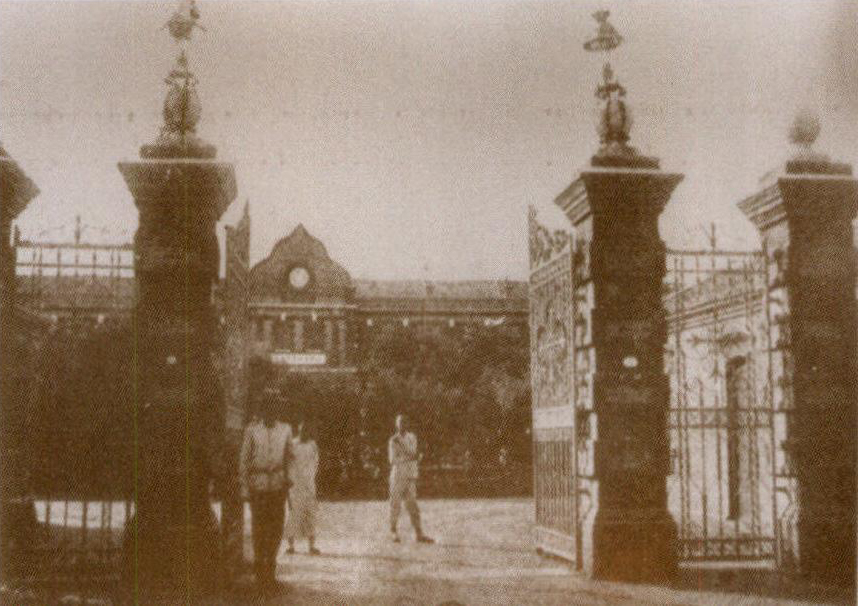历史百科 北洋法政学堂成立
Posted 洋
篇首语:人生就像一场舞会,教会你最初舞步的人,未必能陪你走到散场。本文由小常识网(cha138.com)小编为大家整理,主要介绍了历史百科 北洋法政学堂成立相关的知识,希望对你有一定的参考价值。
历史百科 北洋法政学堂成立
清光绪三十二年(1906),北洋法政专门学堂开始筹办;翌年七月二十三日,举行成立典礼。黎浦任监督,以造就政治通才为主旨。校址在新开河(今河北区志成道103号)
学堂分设本科6年,预、正科各3年。正科又分设政治、法律两科。政治科设政治、经济专业; 法律科设本国法律、国际法专业。正科毕业后授予证书,并给予安置。另有简易科,分绅班、职班,学制一年半。绅班为行政科,招收地方府县保送生; 职班为司法科,专收外地在职人员。学堂有日籍教员9人。
李大钊为该校首期学生,自光绪三十三年(1907)至1913年秋,在该校度过6年学习生涯。他由3年预科,转入3年政治专科,学完了必修的30余门课程,不仅成绩优异,而且才识过人,能诗善文,为全校之冠。同时,他积极投身爱国民主运动; 1912年冬,参加社会党,并被选为天津支部干事;参加北洋法政学会,被选为编辑部长;主持并参加编译了《〈支那分割之运命〉驳议》、《蒙古及蒙古人》。1913年4月,参加组织创办并主编?言治》月刊,至11月,共出版6期; 他在刊物上先后发表诗、文35篇(首),充满强烈的反帝反封建精神和痛心国事、关心民苦的爱国情怀。
毕业后,李大钊曾多次回母校。1923年12月30日,他应邀来津参加母校的18周年校庆,在会上作了《十八年来的回顾》的演讲,对母校的革命传统给予高度评价。
1914年6月,该校与直隶高等商业学校、保定法政学校合并,更名直隶公立法政专门学校。1929年,改称河北省立法商学院,设法、政、经、商4个系,学制4年; 另附设高中班和高、初两级商科职业班; 并开始招收女生。七七事变后,被日军封闭。1947年复校。新中国成立后,分别并入北京政法学院和南开大学。

·北洋法政专门学堂
Beiyang Special School of Law started to be preparedfrom 1906 (the 32nd year of Emperor Guangxu).The founding ceremony was held in July 23 in 1907,whose tenet was to cultivate political talents. Li Pu wasappointed as the supervisor. It was located near XinkaiRiver (No. 103 Zhicheng Road in Hebei District).
The college had a 3-year preparatory course and athree-year college course. The college course includedtwo departments,political science and law. Politicalscience department had two majors,political scienceand economics. Law department had national law andinternational law majors. A student would be grantedwith a diploma after completing the college course andwould be recommended with a job. There was alsocondensed course lasting for one and a half years. Thecondensed course included that for gentries and that forin-service employees. The condensed course for gentriesmajored in administration and the students were thoserecommended by county and prefecture government.The condensed course for in-service employee majoredin law and the students were those non-local in-serviceemployees. The college had nine Japanese teachers.
Li Dazhao was the student of the first term. He hadbeen studying here for six years from 1907 (the 33rdyear of emperor Guangxu) to the autumn of 1913. Hespent three years in preparatory course and three yearsin college course. He finished more than 30 compulsorycourses with outstanding results. He was talented inmany fields. He wrote poems and was one of the bestin writing in the college. He also actively took part inpatriotic and democratic movements. In the winter of1912,he was enrolled in the Social Party and was electedas Secretary of Tianjin Branch. He joined BeiyangAcademy of Law and Political Science and was electedas the Chief Editor. He organized and participated incompiling and editing Refutation to Destiny of ChinaSeparation,Mongolia and Mongol. In April 1913,hestarted Journal on Administration and assumed the officeof Chief Editor. The journal has issued six times byNovember. Li Dazhao published on the journal 35 poemsand articles,all of which permeated his strong hostilityagainst the imperialism and feudalism as well as his loveand care and for the mass,for his motherland.
After graduation,Li Dazhao had returned to thecollege several times. In December 30,1923,he wasinvited back to attend the 18th anniversary of the college.He made a speech with the title of A 18-year Retrospectin which he had given high praise to the revolutionarytradition of the college.
In June 1914,the college was combined with ZhiliAdvanced Trade and Commerce School and BaodingLaw and Political Science School and was renamed ZhiliPublic Law and Political Science College. In 1929,it wasrenamed as Hebei Law and Commerce College. It hadfour departments with a four-year course,including law,political science,economics and commerce departments.It also had preparatory courses for the four departments.In addition,it set higher and lower vocational classesfor commerce. It began to recruit women students. Thecollege was closed by the Japanese army after the eventon July 7th in 1937. It resumed its operation in 1947.After the founding of the new China,it was combinedinto Beijing Law and Political Science College andNankai University.
相关参考
刘积学字群式,河南新蔡人,1880年生。1903年科举人。先后毕业于河南武备学堂、日本日语专门学校、东京实业学校、东京法政大学。1904年创设半日制学堂,后成立学会。1906年在日本加入中国同盟会,并
知名人物 胡嗣瑗生平故事简介,胡嗣瑗历史评价,胡嗣瑗怎么死的?
胡嗣瑗,字晴初(亦作琴初),又字愔仲。贵州贵阳人。1869年(清同治八年)生。1903年(清光绪二十九年)癸卯科进士,授翰林院编修。后以候补道员身份出任天津北洋法政学堂总办。1912年中华民国成立后,
·1903年北洋大学旧貌兴办近代学堂,是洋务运动的重要内容。清光绪十三年(1887),津海关税务司德璀琳,利用外侨和中国官员的捐款,在大营门外梁家园设立了博文书院中西学堂。因为德璀琳与津海关道周馥意见
学校肇始于1896年的山海关北洋铁路官学堂。1912年1月19日,中华民国成立后,学堂由交通部直辖,后更名为唐山铁路学校。1921年7月1日,交通大学正式成立,交通大学下设立北京学校、唐山学校、上海学
曾琦(汉语拼音:ZengQi),(1892~1951)标榜国家主义的政客。中国四川隆昌人。原名昭琮,字慕韩。早年就读于成都法政学堂。后赴日本留学。1918年回国,翌年参与发起成立少年中国学会。19
刘崇杰字子楷,福建闽侯人,1880年生。日本早稻田大学毕业。曾任学部咨议官、视学员,福建法政学堂监督等职。民国成立后,任驻日本公使馆翻译、横滨领事等。1916年任驻日本使馆代办使事。1917年1月任北
曾琦(汉语拼音:ZengQi),(1892~1951)标榜国家主义的政客。中国四川隆昌人。原名昭琮,字慕韩。早年就读于成都法政学堂。后赴日本留学。1918年回国,翌年参与发起成立少年中国学会。19
光绪十一年(1885)正月,李鸿章属下的总统前敌各军的提督周盛波、总统盛军的湖南提督周盛传等,禀请“仿照西国武备书院,设立学堂”。李鸿章批准。并命津海关道周馥操办天津武备学堂创立。由李鸿章下令,直隶提
李鸿章出任直隶总督后,经清廷批准,组建了北洋舰队。开始舰船不多,需要的人员有限,天津没有合适人选,便借才于福建。随着北洋舰队舰艇逐渐增多,人才紧缺,培养水师之事,成为当务之急。光绪六年七月十四日(18
许修直原名卓然,字西溪,江苏无锡人,1880年生。日本中央大学法科毕业。曾任江苏提法司科长,苏州私立法政学堂教习,浙江高等审判厅推事、代理厅长,浙江官立法政学堂教习,大理院推事等职。1924年11月任